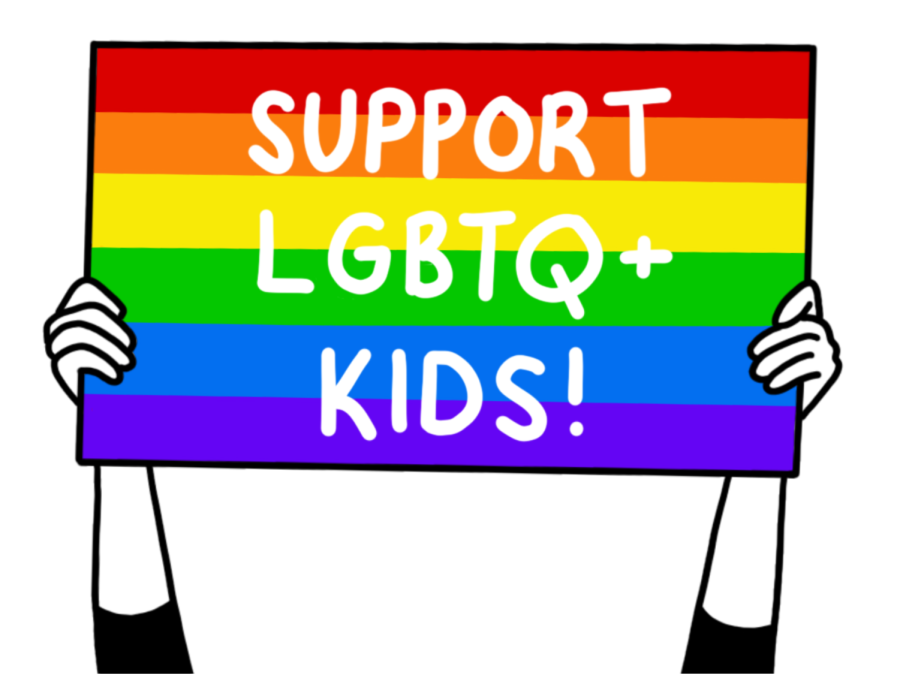Op-ed: Everyone should pay attention to Florida’s “Don’t Say Gay” bill
Florida’s recently passed House Bill 1557 presents potential harm to LGBTQ+ students.
March 27, 2022
Florida lawmakers passed the House Bill 1557, or the “Don’t Say Gay bill,” Feb. 24. Florida House Representative Joe Harding sponsored the bill and argues that it is about “empower[ing] parents,” while opponents claim that it is an act of censorship by the government. The bill was passed by the Florida Senate March 8 and is expected to be signed by Gov. Ron DeSantis.
The bill specifically prohibits “classroom discussion about sexual orientation or gender identity in certain grade levels or in a specific manner.” It later says that “classroom instruction by school personnel or thirdparties on sexual orientation or gender identity may not ocur in kindergarden through grade three or in a manner that is not age appropriate or developmentally appropriate for student.”
It is unlikely that elementary school teachers are teaching kids about sexuality or gender expression unless it is relevant or impacts one of their students. Elementary school teachers are strained enough with teaching in a COVID-19 world, and it is improbable that they have time to devote a lesson to LGBTQ+ identities. The bill is unrealistic because it is addressing something that is not a real issue. With that being said, it will impact the attitudes of teachers and the way students who know members of the LGBTQ+ community see themselves.
A student who has gay parents, who is unable to share family photos or tell happy stories about their parents without anxious glances between Florida teachers, will likely encounter the feeling of “otherness” that they may already face in public spaces. If a student has a gay or transgender sibling, they will likely notice the erasure of the people they love in their school environment.
More importantly, if a student themselves is LGBTQ+, the lack of discussion of queer identites and LGBTQ+ existence will likely make it even harder for that student to accept themselves and eventually come out. It is difficult enough for young people who are queer to figure out their sexuality or gender identity and feel comfortable in their own skin, and the added shame and stigma of not discussing it may make the process even more difficult. Young people are impressionable, and if they sense that being gay is wrong because of it is a prohibited subject in their school, that lesson will stick with them for life.
Media representation is important for the LGBTQ+ community because it allows kids to feel seen and to imagine a future where they can both be true to themselves and achieve anything. Representation also helps to make LGBTQ+ identities more normalized and accepted, especially if a character is not just the token gay character and their sexuality is instead a small part of who they are as a complex and dynamic character. Representation in children’s books in the schools can be a big step towards that. A good way to introduce the subject of gender and sexuality for young audiences is to read a story that has two dads, or has someone who is transgender as a character in the story, without that identity being the focus of the plot.
Additionally, it is not that banning discussions of sex for a first grader is bad, it is that setting a precedent of that the government can dictate student discussion is terrifying. Parents already have all the power over their kids. If they really don’t like something the school is doing, they can put their kid in a private school. Frankly, anything that a parent says at home about gay marriage or gay people will stick with the kid a lot more than anything their teacher said. Hatred is learned and if the parents are determined to pass on racist, homophobic or transphobic views, they will.
This “Don’t Say Gay bill” is essentially an extension of the ban on critical race theory in classrooms. Critical race theory originated as a legal term that refers to a lens for viewing history where race is at the center, but Republicans claimed that their kids were being taught to hate America and to feel ashamed of their skin color. States including Texas, Oklahoma and New Hampshire passed bills that banned the teaching of critical race theory in classrooms. However, critical race theory was never being officially taught in schools, it originated as a legal theory and turned into a moral panic where Republicans made white parents fear that their white children would learn to hate themselves for their skin color based on American history. Ideas involved in critical race theory such as the lingering effects of slavery are taught, but students do not have formal lessons on critical race theory, just as elementary schoolers do not have formal lessons on LGBTQ+ identities.
A bill that prevents a first grader from learning about a gay couple in school will not stop them from seeing a gay couple on the street or someday identifying gay. Gay representation does not make kids gay, nor will banning it make kids straight. If Republican lawmakers are afraid that their kids will be gay someday, limiting discussion of gender and sexuality in school will not ensure that they are cisgender and straight — it will ensure that they will hate themsleves a little bit more. The bill will cause students to feel a little bit more lonely and might make their peers be a little less accepting.
This bill also originally included a clause that forced teachers to tell students’ parents if they came out as anything other than straight. This was highly criticized and ultimately removed from the bill. It is appalling, however, that it was almost included.
Many LGBTQ+ teenagers and kids fear coming out because they are afraid of being abused or kicked out by their parents. Even if they dont get kicked out after coming out, the fear of being rejected is valid and should be respected. Nobody should ever be outed, even if it is likely that they will be accepted, because it should be ultimately left up to the individual to share that part of themselves. Without active protests and social media pressure to take the second part of the bill off, it may still have been included. Legislation like this will go through unless people resist, which is why it is crucial to pay attention to what is happening not only in your state, but across the country. Staying educated on current events and legal issues is a critical first step in being an active member of our democracy.
While the bill has already passed, it is critical that people stay updated on current issues and can advocate for LGBTQ+ rights and representation, whether that is through social media or petitioning lawmakers.
Despite the fact that Northeastern students attend a university in an overwhelming democratic state, some students call states like Florida or Texas home. It is important to remember that while we as students may not be impacted directly, censorship in another state can set the precedent for a spreading movement to dictate what teachers can and cannot say.
First, elementary school teachers cannot address LGBTQ+ rights, but what is next? Limits on middle and high school teachers? While critical race theory has already been banned in some states, it is possible that a more white washed and ingenuine curriculum will be mandated by some lawmakers. It is important that educators are able to do their job and are not restricted by political agendas. Children are the future and if their education is hindered, we will have a less accepting and knowledgeable world.
Additionally, the key distinction about this bill is that discussion is prohibited, not just the curriculum, because the state does and always has had a say on the curriculum itself. To prohibit discussion is to prohibit free thinking and free speech. Students should be encouraged to ask questions and learn through conversations, but if they are discouraged from talking about LGBTQ+ topics, it will perpetuate the stigma surrounding the LGBTQ+ community. Lawmakers should not, and realistically cannot, dictate what students and teachers discuss. Whether or not the bill can realistically or will realistically be followed by all teachers and whether or not the teachers will be held accountable for what they say is not as important as the precedent that this bill is setting and the homophobic attitudes that are being perpetuated.
The bill as it is will affirm bigoted attitudes and perpetuate the idea that being gay or trans is different and shameful to talk about, which is why the bill is extremely dangerous and should be taken seriously by the rest of the country.
Renée Abbott is a first-year journalism and criminal justice major. She can be reached at [email protected].







